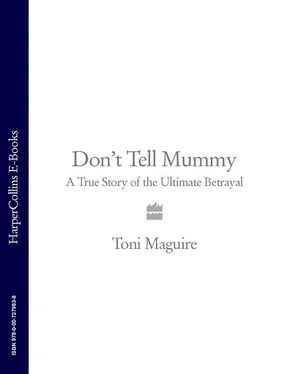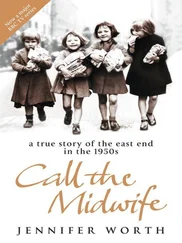‘In that case you will just have to monitor it and my mother more closely,’ I said, more abruptly than I should as a feeling of helplessness rose in me. With that I returned to my mother’s ward.
On entering her eyes held mine.
‘What did the doctor want?’ she asked.
Knowing that she knew, I looked at her squarely in the face.
‘They told me you had called the minister out twice in the middle of the night and that you were very distressed.’ Then my courage failed me as it always did. ‘But we don’t need to worry about it now do we?’
The childhood habit of pandering to her wishes of ‘no discussion’ remained unbroken.
The rest of that first morning she was very tearful. I knew it was common with terminally ill patients, but it still moved me unbearably. Tenderly, I wiped away her tears, remembering days when as a small child she’d done the same for me. She was more affectionate than she had been for many years: she wanted to hold my hand, she wanted to talk and she wanted to remember happier times. I looked at her now, an old lady whose limited days were unlikely to end as peacefully as I wanted, and realized how badly she needed me.
‘How long are you going to stay?’ she asked.
‘For as long as you need me,’ I replied lightly, trying to cover up what I really meant.
My mother, who could always read me, smiled. With a jolt I was reminded of her much younger self and the times when we’d been so close. I felt the surge of my old love.
‘I don’t know how long that will be,’ she said with a wry smile. ‘But I don’t think it will be very long.’
She paused, looked at me and asked: ‘You’ve only come, haven’t you, because you know I’m dying?’
I squeezed her hand, and rubbed the back of it gently with my thumb. ‘I’ve come because you asked me to. I would always have come if you’d asked. And yes, I have come to help you die in peace, because I believe I’m the one person who can do that.’
I hoped she would find the willpower to talk honestly, and for a short time that first day I believed she would.
Pulling on my hand she said: ‘You know, Toni, the days you were a small baby were the happiest times of my life. I remember it as though it was yesterday. When you were born I sat in that hospital bed feeling so proud that at the age of twenty-nine I had produced you. You were such a small, perfect little person. I felt such love for you. I wanted to hold you. I wanted to look after and protect you. I wanted a good life for you. I felt such tenderness and love, that’s what I felt then.’
A lump rose in my throat as I remembered many years ago when I had been encircled by her love. Then she was a mother who cuddled and played with me, read stories and tucked me into bed; a mother whose scent I breathed in as she bent down to give me my good-night kiss.
A child’s voice infiltrated my memory until the sounds became words whispered in my ear.
‘Where did that love disappear to, Toni? Today is your birthday. She says she remembers when you were born. She says how she loved you then, yet fourteen years later she tried to send you to your death. Does she not remember that? Does she not think you do? Has she really blocked it out of her mind? Have you?’
I closed my ears to the voice and willed it to be silent. I wanted to leave my memories in the boxes where they’d been stored for thirty years, never looked at and never thought of except when the witching hours allowed them to escape, when they would hitch a lift on the end of a fading dream. Their ice-cold tentacles would then stroke my subconscious, leaving dim pictures from another time until I awoke to banish them.
Later that day I took her out in her wheelchair around the grounds. She’d always loved creating beautiful gardens; it was as though all her nurturing instincts, which had ceased towards me long ago, went into them.
She asked me to stop at various plants and bushes as she told me their names. Sadly she murmured, more to herself than to me, ‘I’ll never see my garden again.’
I remembered visiting her at the onset of her illness. I’d gone to Northern Ireland with a friend. Taking advantage of the fact that my father was away for the day, playing golf, I had visited my mother. She had proudly shown me photographs of how her garden had looked before she’d started work, a desolate area with clumps of coarse grass and not even a wild flower to enhance it.
As she walked me around she showed me something that instantly brought a smile to my face. On Mother’s Days and birthdays I’d sent her baskets of tiny plants. She showed me how, mixed with others grown from cuttings, she’d replanted them into her eclectic collection of containers, ranging from chimneys and old kitchen sinks to terracotta pots and a drinking trough, creating an explosion of colour around the patio she had designed.
She’d named all the shrubs for me that day too.
‘This is my favourite, it’s called Buddleia,’ she informed me. ‘But I like its nickname better, “the butterfly bush”.’
As if to give credence to its more popular name a cloud of butterflies hovered over the deep purple shrub, their wings shimmering in the afternoon sunlight. Another area gave off a heady aroma of roses, their petals shading from clotted-cream perfection to a dark rich pink. Another area contained her beloved lilies. In another wild flowers blended with the cultivated ones.
‘If they look pretty they’re not weeds,’ she laughed.
There were pebbled walkways, with arches made of wire, where jasmine and honeysuckle had been lovingly trained to grow and add their perfumes to the air. At the base of one nestled a collection of gnomes.
‘My little bit of nonsense,’ she called them.
She looked so happy and serene that day that it became a memory I stored in my mental photograph album. One I could take out at will and enjoy.
The next day I drove to a garden centre, bought her a small summer house to protect her from the elements and had it delivered.
‘So that whatever the weather you can always enjoy your garden,’ I told her, knowing she wouldn’t have more than one more summer to enjoy it.
She had created an English country garden in Northern Ireland, a country she had never taken as her own, always feeling herself a stranger there.
I took that memory out then and felt such sorrow for her, my lonely mother who had created her life out of imagination then turned it into her reality.
There was a side of me that was enjoying being with her in the hospice, despite her frailty. Finally I was able to spend some time alone with her, time I knew was disappearing minute by minute.
That evening I helped put her to bed, brushed her hair back from her brow and kissed her forehead.
‘I’ll be sleeping in the chair beside your bed,’ I told her. ‘I’ll never be very far away.’
After the nurse had given out sleeping pills, I sat holding her hand, which had grown small and fragile. The skin, streaked with blue veins, seemed almost translucent. Someone had given her a manicure, shaping and polishing the nails into ovals and colouring them a pale pink, unlike the soil-stained ones I remembered from my last visit.
Once she’d fallen asleep I took one of my Mavis Cheek novels and went to the lounge. I felt an overwhelming sorrow that the mother I’d once loved so much was dying; sorrow that for all the harm, for all the things she’d done, she’d never been happy. I grieved for the relationship with her I’d always wanted but which, apart from my very early childhood, I had been denied.
The book remained unread that night as control over my memories deserted me. My mind strayed back to those early days I spent with her, days when I’d felt cherished, protected and loved, days that in my memory were always sunny – until the blackness came.
Читать дальше












